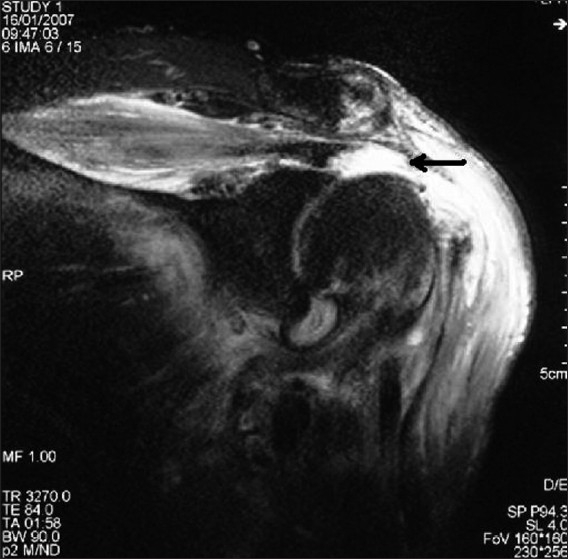Playlist
Show Playlist
Hide Playlist
Adhesive Capsulitis (Frozen Shoulder)
-
Slides Shoulder pain.pdf
-
Reference List Rheumatology.pdf
-
Download Lecture Overview
00:00 That leads us to adhesive capsulitis, which is what really sounds like our patient is experiencing. 00:06 This is also called frozen shoulder and it's essentially an idiopathic condition often brought on by an earlier injury which it sounds like our patient might have had and that leads to this progressive yet reversible immobilization of the shoulder. The specific pathology that we would see if we biopsy the area would be a reversible contracture of the glenohumeral joint capsule. 00:27 Patients, as I said, often report some sort of immobilizing illness or trauma weeks to months previous with compensatory avoidance of use. Our patient said that he'd fallen on to his outstretched arm had probably damaged his rotator cuff at that time henceforth was not moving his shoulder around quite as much and then subsequently developed an adhesive capsulitis. On examination, you're looking for not just pain but actually more stiffness. The patient is just unable to get that shoulder move around even when you're trying to do it for them. They're going to have decreased range of motion particularly with external rotation and abduction and of note, and this is an important feature when we look at our patient, it is more common in those with diabetes for reasons that we really can't fully understand. Alright, so with all that in mind, what do we think is the diagnosis? Well, again, it sounds like he sustained an injury, probably damaged his rotator cuff and perhaps even tore his supraspinatus. As a consequence, he also developed likely some subacromial bursitis and was unable to move that shoulder around. That injury along with the fact that he is diabetic probably led to increasing disuse and progression of an adhesive capsulitis. So all told, he has got rotator cuff tear, subacromial bursitis, and adhesive capsulitis, and probably a little bit of rotator cuff tendinosis as well. So I just gave you a patient with 4 different syndromes happening all at the same time. Cruel, I know. Let's do a quick review. So, shown here on the left column is the different types of historical features and physical exam findings you might see. The columns on the right show specific disease processes and what the findings might also be; whether it's rotator cuff tendinosis, a tear of the rotator cuff, or just adhesive capsulitis. So looking at the first row, shoulder pain. Tendinosis and tears, they should be painful. Adhesive capsulitis itself is not painful unless it was preceded by some other rotator cuff injury. In terms of shoulder stiffness, tendinosis and tears should not cause stiffness, they may cause weakness but not stiffness. It's adhesive capsulitis where that capsule was now stricture down and preventing movement of the shoulder that's going to lead to stiffness. Then we're talking about shoulder weakness which again with rotator cuff tendinosis the tendon is intact so there shouldn't be significant weakness, a tear of course will compromise strength and adhesive capsulitis, again, there may be a prior injury but in its own right adhesive capsulitis is not a weakness problem. Moving on to the physical exam, the painful arc test classically is a test for supraspinatus rotator cuff tendinopathy whereas the drop arm test was turning positive with a rotator cuff tear. It's not really applicable for adhesive capsulitis because you'd never be able to get the arm up high enough to perform those tests in a patient with adhesive capsulitis. And lastly, decreased passive range of motion would be something you would see with adhesive capsulitis.
About the Lecture
The lecture Adhesive Capsulitis (Frozen Shoulder) by Stephen Holt, MD, MS is from the course General Approach to Arthritis and Joint Pain.
Included Quiz Questions
All of the following clinical conditions are causes of secondary adhesive capsulitis except…?
- ...hypertension.
- ...diabetes mellitus.
- ...previous trauma.
- ...subacromial bursitis.
- ...rotator cuff tear.
Which of the following is the hallmark clinical feature of idiopathic adhesive capsulitis?
- Stiffness
- Anterior shoulder pain
- Positive impingement tests
- Weakness with external rotation
- Lateral shoulder pain
Customer reviews
5,0 of 5 stars
| 5 Stars |
|
1 |
| 4 Stars |
|
0 |
| 3 Stars |
|
0 |
| 2 Stars |
|
0 |
| 1 Star |
|
0 |
Usar casos clínicos complejos hace que el aprendizaje se refuerce.




